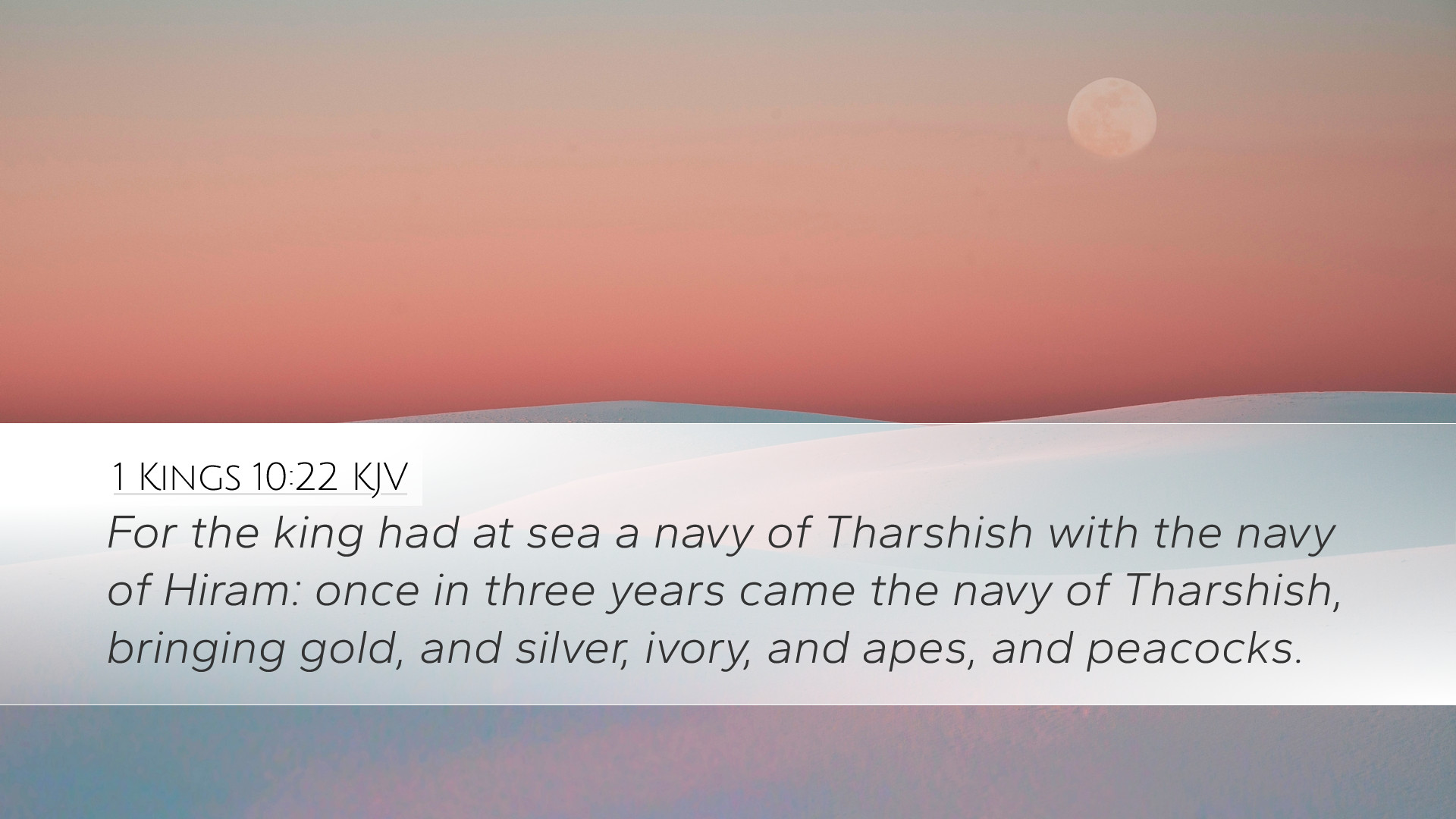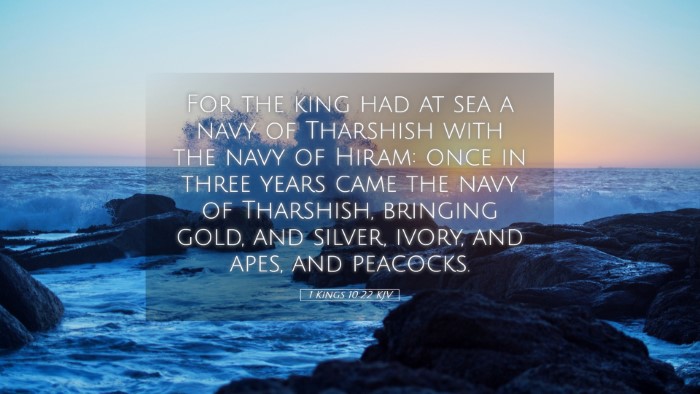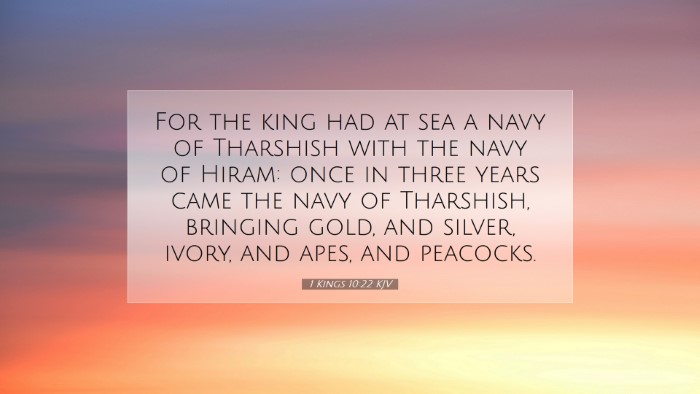Commentary on 1 Kings 10:22
Text of the Verse: "For the king had at sea a navy of Tharshish, to go to Ophir for gold: with the navy of Tharshish once in three years came the gold, and silver, ivory, and apes, and peacocks."
Introduction
This verse captures the grandeur of King Solomon's reign as reflected in his extensive trade expeditions. It serves not only as a statement about wealth but also about the wisdom and strategic thinking behind Solomon’s economic policies. Numerous commentaries have been written throughout history that interpret the significance of these maritime activities.
Trade and Wealth
The extraordinary wealth amassed by Solomon is one of the defining characteristics of his reign. The mention of a "navy of Tharshish" illustrates not just economic prosperity but also the technological and logistical capabilities of Solomon’s kingdom. The following insights can be derived from public domain commentaries:
-
Matthew Henry:
Henry emphasizes that Solomon's wisdom extended beyond governance; it also encompassed economic strategy. The production of trade goods from distant lands like Ophir indicates a far-reaching influence and affluence that was uncommon in the ancient world.
-
Albert Barnes:
Barnes elaborates on the materials imported, noting their rarity and value in the ancient context. The inclusion of "ivory, apes, and peacocks" points to the exotic nature of the goods sought by Solomon, signifying both luxury and a deep trade network.
-
Adam Clarke:
Clarke highlights the periodic nature of these voyages, suggesting that they were planned and executed over several years. This reflects a sustainable economic strategy, ensuring consistent trade without overextending resources.
Symbolism of Gold and Wealth
Gold has long been a symbol of wealth and power. The returns from these voyages added not just to Solomon's treasury, but also to his reputation as a wise and affluent leader. The commentaries provide profound insight on this aspect:
-
Matthew Henry:
In his commentary, Henry notes that such wealth can serve a dual purpose; it can be a blessing when used for the glory of God and the benefit of the nation, though it poses the danger of idolatry and pride.
-
Albert Barnes:
Barnes comments on the spiritual implications of wealth. He asserts that Solomon's wealth should be viewed through the lens of divine favor, where successful trade and riches reflect God's blessing upon righteous leadership.
-
Adam Clarke:
Clarke warns readers that lavish wealth can lead to moral decay. He indicates that the resources gained through trade must be handled with wisdom and gratitude to prevent the nation from drifting into excess and luxury.
The Significance of Maritime Trade
This verse emphasizes maritime trade, which was crucial in expanding both the influence of Israel and its economy. The commentaries delve into the broader implications of Solomon's naval fleet:
-
Matthew Henry:
Henry explains that Solomon’s navy signifies a leap in Israel’s capabilities, marking a new era in their history. This advancement showcases not only military might but also a rich economy that could sustain such an investment.
-
Albert Barnes:
Barnes praises the navy's role in establishing Israel as a significant player in international trade. He states that Solomon was wise to recognize the importance of maritime power, enabling his country to tap into global resources.
-
Adam Clarke:
Clarke provides a practical perspective, noting the logistical advancements that Solomon achieved, which allowed for seamless trade operations. He also suggests that these expeditions were a symbol of the sophistication of Solomon's administration.
Theological Insight
This verse can be viewed through a theological lens, reflecting the relationship between divine providence and human agency:
-
Matthew Henry:
Henry notes that Solomon's wealth should remind readers of God’s provision for His people. The blessings Solomon experienced were not merely the result of human effort but were intertwined with God’s favor.
-
Albert Barnes:
Barnes emphasizes the covenantal aspect of Solomon’s wealth. According to him, this bounty is a manifestation of God’s promises to Israel, encouraging believers to trust in divine provision and faithfulness.
-
Adam Clarke:
Clarke reflects on the dynamic between human wisdom and divine guidance, suggesting that while Solomon acted wisely in trade, it was ultimately God’s plans that prevailed in the successful execution of these endeavors.
Conclusion
1 Kings 10:22 presents a multifaceted view of Solomon’s reign, illustrating themes of wealth, trade, divine favor, and wisdom. The insights drawn from esteemed public domain commentaries like those of Matthew Henry, Albert Barnes, and Adam Clarke provide layered understanding, inviting deeper reflection for pastors, students, and scholars alike. This verse not only celebrates the material prosperity of the kingdom but also challenges contemporary readers to consider the moral and spiritual implications of wealth and power.


